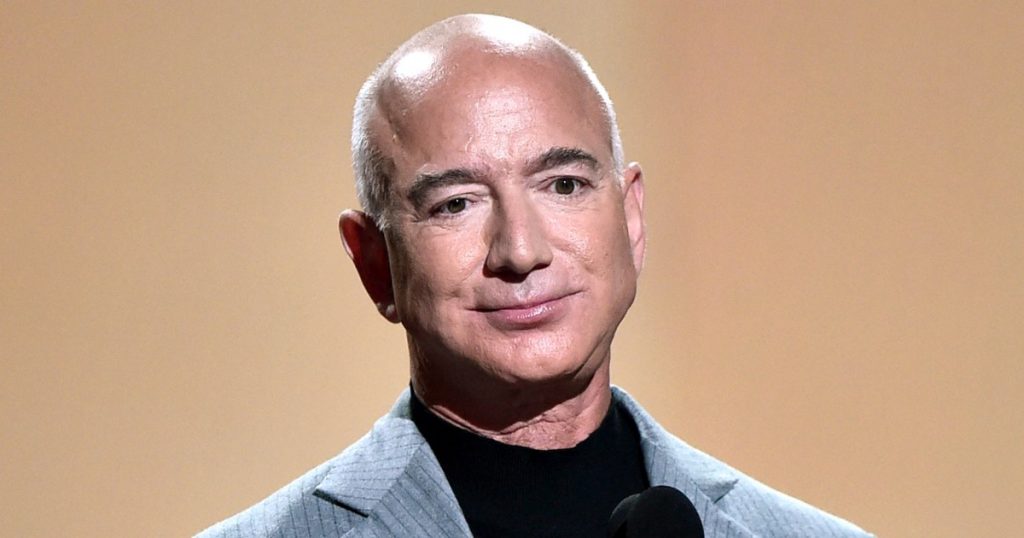Jeff Bezos, the billionaire Amazon founder who owns The Washington Post, defended the newspaper’s decision to stop endorsing presidential candidates, arguing in part that the move is a way to shore up credibility and combat perceptions of political bias.
“Presidential endorsements do nothing to tip the scales of an election. No undecided voters in Pennsylvania are going to say, ‘I’m going with Newspaper A’s endorsement.’ None. What presidential endorsements actually do is create a perception of bias. A perception of non-independence. Ending them is a principled decision, and it’s the right one,” Bezos wrote in a nine-paragraph article published on the Post’s website Monday night.
Bezos published his comments three days after Will Lewis, the publisher and chief executive officer of the Post, announced that the storied publication would not make a presidential endorsement this year or “in any future presidential election” — breaking with decades of tradition. The announcement sparked immediate backlash from readers, current and former staff members, an employee guild and liberal social media influencers.
NPR reported Monday that the newspaper has lost more than 200,000 digital subscribers since Lewis’ announcement. At least three members of the newspaper’s editorial board have stepped down in protest.
The Post’s editorial page had planned to endorse the Democratic nominee, Vice President Kamala Harris, according to the newspaper’s own reporting. The Post, in an article citing four people who were briefed on the matter, reported that Bezos made the decision to stop issuing presidential endorsements. The newspaper has denied that claim through spokespeople.
Bezos acknowledged that the move could have been handled better.
“I wish we had made the change earlier than we did, in a moment further from the election and the emotions around it,” Bezos wrote. “That was inadequate planning, and not some intentional strategy.”
Bezos also flatly denied that there was a “quid pro quo of any kind” with Harris or former President Donald Trump, adding that neither “campaign nor candidate was consulted or informed at any level or in any way about this decision.”
“Dave Limp, the chief executive of one of my companies, Blue Origin, met with former president Donald Trump on the day of our announcement,” Bezos wrote. “I sighed when I found out, because I knew it would provide ammunition to those who would like to frame this as anything other than a principled decision. But the fact is, I didn’t know about the meeting beforehand. Even Limp didn’t know about it in advance; the meeting was scheduled quickly that morning. There is no connection between it and our decision on presidential endorsements, and any suggestion otherwise is false.”
Bezos, who purchased the Post for $250 million in 2013, insisted that he would not use the publication as a vehicle for his “personal interest” and argued that the 146-year-old newspaper will need to “exercise new muscles” to stay commercially competitive and culturally current.
“While I do not and will not push my personal interest, I will also not allow this paper to stay on autopilot and fade into irrelevance — overtaken by unresearched podcasts and social media barbs — not without a fight,” he wrote. “It’s too important. The stakes are too high. Now more than ever the world needs a credible, trusted, independent voice, and where better for that voice to originate than the capital city of the most important country in the world?”
The members of the editorial board who announced their resignations earlier Monday said they believed it was imperative for the newspaper to formally back Harris over Trump, whom they described as a threat to American democracy and the free press.
“I believe we face a very real threat of autocracy in the candidacy of Donald Trump,” contributing editor David Hoffman wrote in a resignation letter to David Shipley, the editor of the editorial page. “I find it untenable and unconscionable that we have lost our voice at this perilous moment.” (Hoffman shared a copy of the letter with NBC News.)
Marty Baron, the executive editor of the Post from 2012 until his retirement in 2021, criticized Bezos’ comments in a statement to MSNBC, saying in part: “Refraining from a presidential endorsement within two weeks of one of the most highly consequential elections in American history does not inspire trust. It erodes it. That should have been obvious.”
The Post’s non-endorsement came days after news broke that the Los Angeles Times would not get behind Trump or Harris ahead of the Nov. 5 general election. The news website Semafor reported that the newspaper was preparing to back Harris but that owner Patrick Soon-Shiong blocked the editorial page from getting behind either candidate. (NBC News has not independently verified the report.)


